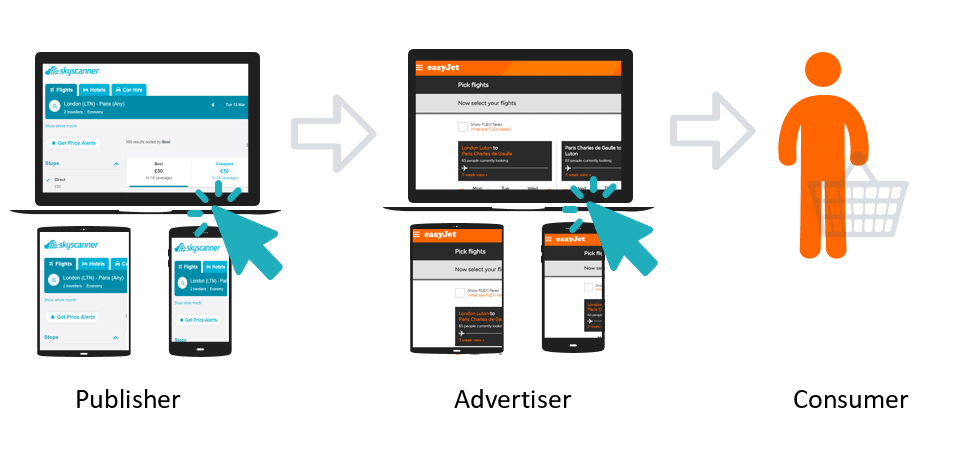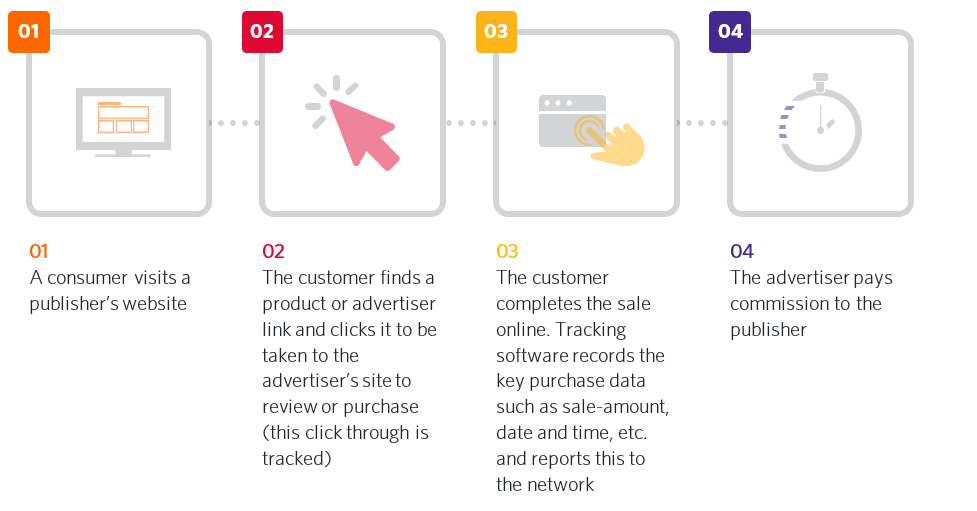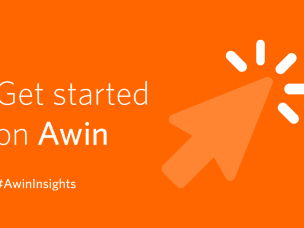Affiliate Marketing: The Ultimate Guide 2020
Written by Samantha Sherer on 25 minute read
Maybe you've heard the term, but still ask yourself, "What exactly is affiliate marketing?"

There’s so much information out there, it can become completely overwhelming to know where to begin.
What’s more, you know affiliate marketing has been around for a long time, so you’re kind of embarrassed to ask the wrong questions.
Thanks to Awin’s years of experience in affiliate marketing globally, we think we’re pretty qualified to help. Want to find out more about how affiliate marketing works?
In Affiliate Marketing: The Ultimate Guide, we’ll cover the most important things you need to know about the world of affiliate marketing.
- What is affiliate marketing?
- Terminology used in Affiliate Marketing
- How does affiliate marketing work?
- The benefits of affiliate marketing for businesses
- Affiliate marketing: How to start as an advertiser
- Affiliate marketing: How to start as a publisher
- How do affiliate marketers get paid?
- Affiliate marketing tips for beginners
- Examples of affiliate marketing programs
Whether you’re a business looking to expand your audience or hoping to build your own company as an affiliate, from terminology to tips, we’ll cover it all.
What is affiliate marketing?
Affiliate marketing is a performance-based, referral marketing channel in which a publisher or affiliate is awarded a commission for their part in sales they generate for an advertiser or merchant.
The publisher promotes products and services using a unique link, which sends traffic to the company’s website. They are rewarded a commission when a visitor on their site clicks an affiliate link (for example a banner, logo, or text link), goes to the advertiser's website associated with that affiliate link, and performs a certain action on the advertiser's site. Usually, this is completing a transaction. However, some advertisers ask publishers to refer traffic to them that results in a lead instead of a sale, perhaps through the completion of an online application form or the submission of the user's email address.
Under this umbrella of performance marketing, the advertiser only pays on results, ensuring it is a low-risk method with the potential to reap a profitable reward.
From a business perspective, it can be thought of as a way of expanding your marketing team by hiring people through third-party companies that are only paid for their involvement in a successful sale, or as outsourcing your marketing, rather than employing an in-house marketing team.
Terminology used in affiliate marketing
Although there are only four parties involved in affiliate marketing each goes by several different names, which can be confusing. To clarify, here are some of the names you may come across:
- Advertiser: The person or company who owns the product. Other names include merchant, owner, seller, brand, retailer, creator, vendor.
- Publisher: The person or company that promotes and sells the advertiser’s product. Other names include affiliate, marketer, partner, blogger, influencer and affiliate marketer. This can be an individual who promotes through a website/blog, email, social media, or YouTube, or it could be a large company that runs several different websites or businesses.
- Affiliate network: A company that acts as the middle man between advertisers and publishers, providing a platform for publishers to sign up to affiliate programs of their choice. You may also hear them referred to as an affiliate marketplace.
- Consumer: The person who ultimately buys the product. Other names include buyer, costumer shopper, or client.
Other common terminology you will come across includes:
- Affiliate program: Also known as an associate program or partner referral program. The advertiser sets the program, which the publisher then promotes.
- Affiliate tracking: The unique coding that tells the advertiser who to pay the commission to.
What is an advertiser?
An advertiser in affiliate marketing is someone who owns products or services that are promoted through affiliate marketing. An advertiser is concerned with increasing sales, and to do this they need to partner with good-quality publishers.
The advertiser generally provides the links, banners, texts and content to be used to promote the products or services. They also assign each publisher a unique code to allow them to track each publisher's sales, if they have the technology to do so, and payout commissions accordingly.
What is a publisher?
A publisher is an individual, company, or business that earns commission from links promoting the advertisers’ products or services. This may be through the copy on websites, blogs or articles, social media posts, newsletter and email updates, or clickable banners or images.
A publisher works with advertisers either directly, through an agency or through an affiliate network. They sign up for advertisers’ affiliate programs that match their market and their audience’s needs. Any sales generated through their links are tracked so earnings can be accurately accredited to them.
If the publisher is working through a network, they have access to a variety of tools and technology, partnership opportunities, reporting and support to help them monitor their promotional campaigns. To maximize the earning potential of a publisher’s audience, they will need to research the best affiliate networks available to do this.
What is an affiliate network?
An affiliate network, like Awin, controls tracking, payments and facilitates the relationships between publisher and advertiser.
Once signed up to Awin, publishers have the freedom to browse an array of different advertiser programs via our User Interface (UI) or Advertiser Directory, and can request to join them. Once a publisher’s request to join an advertiser program has been accepted, they can begin promoting the advertiser products and services on their website and earn commission on sales they generate.
Awin has a dedicated compliance team that individually reviews each publisher application to the network to ensure the quality and security of the publishers offered to advertisers.
How does affiliate marketing work?
The process of affiliate marketing is straightforward:
- Potential customer lands on the website of the publisher (the affiliate)
- Customer clicks an affiliate link that takes them to a landing page detailing the advertiser's product
- Customer buys product
- The publisher earns a percentage of the sale as a commission
The affiliate link the customer clicks on has a unique code recognized as belonging to the publisher. The advertiser tracks the code (or utilizes an affiliate network’s tracking system) and pays out accordingly.
For example, when looking to purchase a new printer you may research offers on a website, such as RetailMeNot. Once you have found the best deal, in this case, HP printers, you would then click through the deal to their site to make a purchase. In this example, RetailMeNot is the publisher and the advertiser is HP, as this is the site where you complete the purchase. HP would then pay RetailMeNot a commission for generating a sale through their site.
The 7 main benefits of affiliate marketing for businesses
In a world where businesses are being bombarded from all directions with different marketing channels and strategies, it may feel overwhelming to try and embrace a new advertising method. Yet, there are many reasons why affiliate marketing is a popular method for brands to grow.
1 - Targeted traffic
By working with affiliates who understand your industry, you will receive targeted sales from a warmed-up audience.
2 - Pay for performance and sales
In its simplest form, you only pay out when a sale is made, while also offering flexibility to pay publishers for influencing sales. If the affiliate marketing partner has an ineffective campaign, it won’t affect your budget.
3 - Low risk
Paying for performance rather than for clicks ensures you won’t be using your budget to create leads that need nurturing. You will create direct customers who you can then build relationships with and upsell to, at the right time.
4 - Limited start up costs
Working with an affiliate network platform like Awin takes the stress and time out of setting up the program. We will guide you through the setup, carry out the background work and provide the tools and resources you need.
5 - Grow brand awareness
Consumers like to buy from retailers they are familiar with. Affiliate marketing allows companies to grow their brand awareness by increasing exposure to new and alternative audiences who may not have previously heard of them.
6 - Access to foreign markets
If your brand and products can be marketed worldwide, affiliate marketing is a cost-effective and efficient way to tap into that global marketplace. Professional affiliates based internationally can use their local knowledge to market your products strategically.
7 - Detailed statistics and data
Working with a trusted affiliate network to manage your affiliate marketing allows you access to a detailed dashboard and sales reports. You can monitor your data to effectively strategize and make marketing decisions within your business.
Affiliate marketing: How to start as an advertiser
Decide upon your product
This is technically step Zero. Decide what it is that you would like to sell as a business. Or is it just that you would like to create brand awareness for your business itself? Either way, decide what it is that you want to receive new exposure and create a plan around how you would like that to look.
Test the market
Always test the market when beginning any new business, but particularly if you intend to create a physical product. What you may consider a good idea just may not work for the people you hope to sell it to. And if no one wants to buy it, your efforts will be wasted. You can do this in a variety of ways. Simply asking an already wide audience is a great start. Find groups and forums relevant to your idea and gather peoples’ thoughts.
You can even run test ad campaigns on social media directed to landing pages, and see how many click-throughs you receive. Crunch these numbers.
Make sure to consult a wide range of people and look objectively at the feedback and data this may give you.
Join an affiliate network
Once you have confirmed that your idea is viable, it’s time to join an affiliate network. Awin gives you access to publishers all over the world with a range of audiences to suit your needs. We can guide you through the process with our expertise but also have a wealth of information and materials for you to delve deeper into the world of affiliate marketing too.
Connect with the right publishers
It’s not just enough to get lots of publishers on board with your campaign. Your goal should be to get the right publishers on board. This means those with an audience in the space you hope to grow. You can actively search for those who you feel fit within your niche or for those who align with your brand values. A good connection will be beneficial for both parties.
Create collateral for your publishers
Some publishers will require collateral to help push your brand to their audience. You will need to be able to give them high quality images in a range of formats and sizes. They may need logos or digital banners. Some might require video content of your products or the physical product itself. This will all depend on those you connect with and your niche.
It will be helpful to have as much collateral available as possible when inviting publishers to join your campaign. However, it takes time to fully understand what a publisher could need from you to make their ability to promote you easier.
Affiliate marketing: How to start as a publisher
Start from scratch or incorporate publishing into an existing business
If you’re starting completely from scratch you need to complete a few background steps before looking at affiliate programs. You need to decide on a niche you are interested in that has the potential to make money. Then you can begin to build your audience by creating content relevant to this topic.
When you have built an audience, start researching affiliate programs that fit in your niche and sign up for those your audience will benefit from. Continually create content around your programs and promote to your followers, making sure to include the affiliate link.
If you already have an existing business, then it is mainly a matter of choosing an affiliate program to promote and publicize to your followers.
A website or blog is not compulsory to run an affiliate marketing business. You can use landing pages and drive traffic to them through email marketing, pay-per-click or other forms of advertising, but a blog will help build a relationship with your followers and make them more eager to purchase from you.
Finding your niche
The importance of choosing your niche (the subject or industry you want to focus on) cannot be underestimated. It’s one of the most important decisions to make, yet can be the most challenging. When deciding, consider these points:
- What do you already have knowledge on?
- What areas are you passionate about?
- Are other people equally interested?
- Is it evergreen? (i.e. it is not an overnight wonder)
- Are there affiliate programs for this subject?
- Does the niche have a good track record of product/service sales?
- Is it profitable?
To answer these, you will need to do detailed research rather than relying on gut instinct.
A subject you are interested in is always a good place to start as you are more likely to be able to write content week in, week out. However, just because it fascinates you does not mean that others are equally interested.
Demand from customers
Demand from potential buyers is the most important aspect, and you can’t rely on guesswork to gauge this. You should have some ideas about the type of niche you want to develop, but how do you know if there is demand from potential buyers? Running through a few steps can help you discover if it is worth pursuing.
- Check out the search volume. You can do this by using Google keyword search or similar software to get an idea of how many people are searching for your niche.
- Look for products for sale in the niche. If there are lots, this is a good sign.
- Search for affiliate programs. If there are many to choose from it not only shows that it is a popular, in-demand niche, but there will also be plenty of products and services to offer for sale. When you join a network, such as Awin, you can also find out additional information about the products regarding sales to date and how many affiliates are selling each product.
- Use the search term “[your niche] + affiliate program. This will show all the results for companies in your niche who offer affiliate programs.
- Check out other websites and blogs in your niche, as well as social media pages. Is there plenty of online activity such as comments, shares, large audience?
- Do a shopping display search to see how many products there are in the Google shopping feed.
Positive results from these searches demonstrate a healthy demand for products in your chosen niche, with many affiliate programs to choose from. All of this indicates you can make money as an affiliate marketer in your preferred niche.
With your niche decided, it is time to become an affiliate marketer.
How do I become an affiliate marketer?
To become an affiliate marketer, you need to sign up to affiliate programs in your niche. Your research should have exposed several that fit your audience and have the potential to make money. After your account has been approved, start marketing and promoting your offers. To be able to call yourself an affiliate marketer you simply need to make at least one sale through an affiliate link that you have promoted. As soon as you have made that first commission you are officially an affiliate marketer.
How do affiliate marketers get paid?
Generally, affiliate programs work on a cost per acquisition (CPA) basis where the last publisher site visited before the consumer makes the sale is awarded a commission. For Awin, this means our publishers earn a commission based on a percentage of the final basket value from the sale they drove. While this is the most common form of payment, some publishers receive a commission for generating leads, clicks, impressions, or influence.
Cost per lead refers to the advertiser paying the publisher for any sign ups they generate from interested customers. Payment on clicks will be each time an ad is clicked, whereas impression refers to the number of times an advertiser’s ad loads on the publisher page. Another payment type that Awin has implemented is ‘Payment on Influence.' This means that a publisher could be awarded a commission for a sale they have helped to generate, even if they weren’t the last click in the customer journey.
For example, if a consumer clicks on an affiliate link within an article of a blog, but before completing the purchase, searches and clicks through to a discount code site; traditionally, the coupon code publisher would be awarded for this sale, since they were the ‘last click.’ However, the affiliate marketing industry is becoming increasingly aware of the value that these upper-funnel publishers add to the consumer journey and are able to still reward them for their influence.
How does affiliate tracking work?
The UI dashboard hosts different tools to enable the tracking of the customer journey, and a range of reports so publishers can keep up to date with performance data.
In order to track which publisher is generating sales for an advertiser and pay commission accurately, it’s essential to have a tracking program in place. Our tracking consists of five different elements:
- The MasterTag
- The Conversion Tag
- Server-to-Server tracking
- Fallback Conversion Pixel
- Product-Level Tracking
The MasterTag contains all the necessary functions for tracking, including creating a first-party cookie (which isn’t blocked by browsers), allowing for cross-device tracking and bypassing ad-blocking technologies. This JavaScript code allows for seamless tracking and needs to be integrated on every page of both the publisher’s and advertiser’s sites, except those processing payment information.
The second element, the Conversion Tag, lets the MasterTag know a conversion has happened and it sits on the advertiser’s confirmation page. The MasterTag then sends the transactional information back to Awin for reporting and processing.
In the event the Conversion Tag does not work, a Fallback Pixel is used as an additional tracking method that sits on the advertiser’s confirmation page and works similarly with the MasterTag.
Recently, browsers are blocking third-party cookies to protect consumer privacy in the wake of stricter data regulations. In order to guarantee the highest quality of tracking independent of browsers, Awin encourages all advertisers to implement Server-to-Server tracking. This means tracking codes are activated from the server-side and sit on the advertiser’s confirmation page.
Product-Level Tracking is not mandatory but has many reporting benefits as it allows advertisers to track sales to each individually-purchased product. This means the performance of individual products and product categories can be easily measured. Once the MasterTag is properly set up, turning this element of tracking on is simple.
Affiliate marketing tips for beginners
How to choose the best affiliate network for you
With many affiliate networks to choose from, some new publishers find choosing the right one to work with daunting. At this stage in your affiliate marketing business, it is important to work with an experienced network that not only has a good range of programs but can support and guide you through the process.
Founded in 2000, Awin has established partnerships and connections globally and understands the needs of both affiliates and retailers s. Over the years Awin has worked tirelessly to provide a platform that delivers an innovative approach to affiliate marketing, concentrated on a duty of care and security for all of its clients. Many new publishers entering the marketplace choose Awin, as their experience and attention to detail provides the right guidance and support needed to make a success of your business.
This stage of your affiliate marketing career can be challenging and confusing, but with the right understanding of how to progress, and good support systems in place, it should also be exciting and stimulating. Most of all, enjoy the journey. We look forward to being there beside you.
Educate yourself on ad-blockers and data privacy
It’s natural for affiliate marketers to be concerned about ad-blockers - especially in our current ITP world - as they can affect who sees your advertising. However, the online marketing world is constantly evolving to the changes thrown at it, and this is no exception. There is more positive news, as Chrome’s new version ad blocker only blocks ads that don’t comply with the Better Ads Standards. This means poor quality publishers are being driven out, while reputable publishers continue to thrive.
Select an affiliate marketing sector
There are various ways to undertake affiliate marketing, and a range of different types of publishers to work with. The most common affiliate marketing sectors include:
- Bloggers and editorial content – Bloggers and content sites earn money by writing and sharing great content that their audience wants to read. Either directly within the content or alongside it, they promote affiliate products. The products tend to be highly correlated to the content and targeted at a warm audience. Because of this, promotions are usually very successful.
- Coupon code sites – Consumers love discounts and 59% state that coupon codes influence their buying decision more than any other form of promotion. Brands can use this to their advantage by partnering with affiliate networks that distribute brands' promotions to coupon code sites. These websites then work to drive traffic to the deal on offer. Coupon code websites include marketplace sites, which list the codes by brand and type; UGC (user-generated content) or community sites, which rely on discussion by the users to promote the codes or offers, although these can be heavily regulated; Cashback or loyalty websites, which pay out small commissions to loyal users of their sites and often also list codes that can be used via their channel; Apps and browser extensions, which help consumers quickly find discounts while shopping; and blogs, which provide content on topics and share related discount codes.
- Mass Media sites – These sites review and compare different products, many of which will be affiliate products. Audiences search for product reviews as a way to reassure themselves of quality and value prior to purchasing. Review sites are a form of social proof.
- Email marketing – Email marketers contact their lists on a regular basis, with the frequency depending on the types of offers or newsletters the user has signed up to receive. The emails can be a mixture of useful content and promotional material. Emailers work hard to build authority and trust with their audiences so that when they recommend a certain product, their purchase rate tends to be high.
- Social media influencers – Influencers are individuals who have developed a presence online and are respected within their niches. Their videos and content are watched by an audience that regards them as their peers and trusts their judgement. When they promote or discuss new products it has the potential to go viral if their audience shares it.
Examples of affiliate marketing programs
Due to the FTC affiliate disclosure regulations, publishers who include links for which they receive commissions have to clearly note that this is a paid-for advertisement to their readers. This is to provide complete transparency to the audience so they make their decisions based on the full knowledge that the publisher is being paid to promote. Awin’s recently launched tool adMission - a simple tool that allows publishers to feature disclosure text on their websites in support of increasing disclosure regulations - can aid publishers in their compliance efforts.
Disclosure is generally accepted without issue and has minimal impact on the reliability that the audience applies to the content. This is because quality publishers only promote those products they fully believe in, otherwise they would be at risk of losing their audience’s trust, and without their audience, they do not have a business model. Their audience receives a ton of free information and huge value from the publisher, and as such, they are generally happy to accept affiliate recommendations from them.
There are now affiliate programs offered across a huge array of industries. Dig past the over-promoted niches like dietary supplements to find affiliate marketing examples across well-respected industries like telecommunications, travel, finance, insurance, technology, retail and much more.
Some well-known businesses offering affiliate programs include:
- Viator, A TripAdvisor Company – A leading global vacation tours and experiences website
- HP – Technology including computers, printers and more
- Under Armour - Sports brand
- SkinStore - Premium beauty products
- Etsy - A global marketplace for vintage and handmade items
These five examples are just a small snippet of the different types of affiliate marketing programs available, demonstrating the breadth of the possibilities on offer.
Some websites are fueled entirely by affiliate links; a good example being the reputable PCMag. This website is aimed at the computer and technology audience and includes the latest news and product information.
Another great example of a website using affiliate marketing to fund itself while offering value to its readers is Urban Tastebud, which promotes subscription boxes and innovative food products, which are all affiliate programs.
With both of these publishers, they have built up a loyal audience based on great content and products. The readers buy through these links as they trust the promoting website.
A final word
For businesses, time spent on marketing is time spent away from developing other aspects of your business, such as product development. Yet without brand exposure, your business will stagnate. If you are struggling to find a happy medium between developing and marketing, consider affiliate marketing.
Affiliate marketing provides a cost-effective and timesaving solution to boost your brand and revitalize your business. By exposing your brand to previously untapped audiences through publishers, you can not only extend the reach of your products but also develop a buzz around your brand. You have nothing to lose except your current lack of marketing magic.
For publishers, starting out as an affiliate marketer can seem daunting in a large market, but there is room for everyone. Establish your niche and build your audience. A trustworthy relationship will lead to more financial reward in the future.
Once you have signed up to Awin, if you’re still feeling a little lost, don’t hesitate to reach out. We’re happy to use our years of knowledge to guide you to the path of success.











